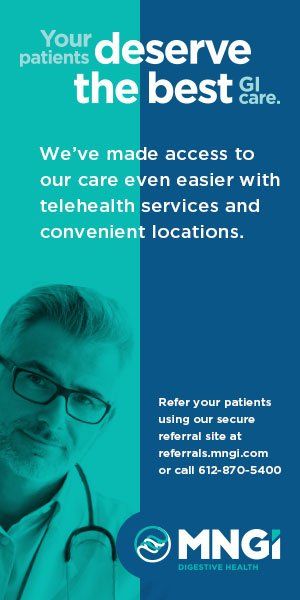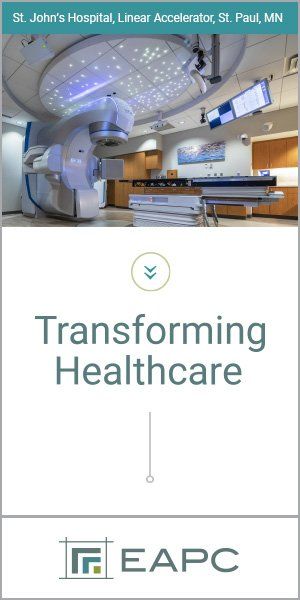Capsules
New Partnership Between Children’s Minnesota and PrairieCare
Children’s Minnesota and PrairieCare recently announced a new partnership that will deliver high-quality psychiatric care to kids as young as six years old. Children’s Minnesota will open its first inpatient mental health unit this fall. PrairieCare will provide programmatic guidance and joint clinical leadership for the new unit, where Dr. Ryan Williams, PrairieCare’s physician executive, has been appointed as the medical director of inpatient psychiatry. “We’re excited to partner with PrairieCare to deliver the highest quality mental health services to kids in our community,” said Dr. Gigi Chawla, vice president and chief of general pediatrics at Children’s Minnesota. “Children’s Minnesota is committed to providing the full continuum of mental health services tailored for kids in the region to improve access, equitable care and treatment throughout a child’s mental health journey.” Dr. Williams stated, “This partnership is a testament to the dedication of both PrairieCare and Children’s Minnesota to address the unmet mental health needs of our children.Kids and young adults need access to mental health resources designed for their specific, age-appropriate and medical needs, and we look forward to providing this personalized care to our community soon.”
The new Children’s Minnesota inpatient mental health unit will care for approximately one thousand children and adolescents each year; it will provide a healing environment, which includes 22 dedicated inpatient psychiatric beds at the system’s St. Paul hospital, allowing parents to stay overnight with their child. It will be the first inpatient unit in the east metro to treat kids under 12 years old. It will also be able to serve children with more complex medical needs, meeting the urgent mental health needs of the most vulnerable kids in Minnesota and the region. A dedicated, multi-disciplinary care team of psychiatrists, psychologists, program therapists, nurses, occupational therapists, child life and music therapists will provide individualized treatment tailored to meet each child’s needs.
Mayo and UnitedHealthcare Reach Medicare Advantage Agreement
Mayo Clinic and UnitedHealthcare (UHC) have reached an agreement on a new multi-year network relationship. The agreement ensures members enrolled in UHC employer-sponsored and individual health plans have continued access to quality care at Mayo Clinic’s national network of hospitals, clinics, physicians and other providers. The parties have also established a new relationship that will give members enrolled in UHC Medicare Advantage plans in-network access to Mayo Clinic Rochester and Mayo Clinic Health System sites in the Midwest for the first time, effective January 1, 2023. “We look forward to building on the continued strong relationship between Mayo Clinic and UnitedHealthcare,” said Lyell Jones, MD, a Mayo Clinic neurologist and medical director for Contracting and Payer Relations. “Agreements between Mayo Clinic and leading insurers such as UnitedHealthcare help ensure access for patients who need serious and complex care.”
UHC is the nation’s largest Medicare Advantage provider and for some time had been unable to agree with Mayo Clinic on terms allowing its members’ access to Mayo Clinic services. UHC (or mayo?) offers a full spectrum of health benefit programs for individuals, employers and Medicare and Medicaid beneficiaries; it contracts directly with more than 1.5 million physicians and care professionals, as well as 7,000 hospitals and other care facilities nationwide. “We’re grateful for the opportunity to begin providing our Medicare Advantage members network access to Mayo Clinic’s facilities and physicians,” said Craig Stillman, CEO, UHC Medicare & Retirement of the Upper Midwest. “We’re expanding and strengthening our longstanding relationship with Mayo Clinic, one of the most highly regarded medical institutions in the world.” In 2021, Mayo Clinic cared for more than 1.4 million patients from every U.S. state and 139 countries.
GS Labs Counter Sues BC/BS Minnesota
GS Labs, a nationwide provider of COVID-19 rapid tests, has filed new counterclaims in the company’s ongoing legal battle against Blue Cross Blue Shield (BC/BS) of Minnesota. The June 29th filing in U.S. District Court for the District of Minnesota flatly denies all prior allegations made by BC/BS of Minnesota against GS Labs. GS Labs has also alleged 21 counterclaims against BC/BS of Minnesota, detailing a scheme to harm competition in violation of the federal antitrust laws. Its conspiracy with other Blue insurance companies, in a cartel to fix prices and illegally boycott quality testing labs, resulted in COVID testing shortages in Minnesota. The counter complaint also sets forth factual allegations showing BC/BS of Minnesota committed consumer fraud by misleading Minnesotans in need of COVID testing, tortiously interfering with GS Labs’ business relationships, and violating the CARES Act by refusing to reimburse GS Labs for thousands of COVID tests for its insureds. “Throughout the pandemic, GS Labs has been there to provide fast and accurate testing for more than 300,000 Minnesotans,” said Jen Rae Wang, a representative for the company. “While insurance companies across the U.S. have paid GS Labs for these services, BC/BS of Minnesota has colluded with other Blues to suppress testing, boycott GS Labs, and price-fix across the state and the nation. That anti-competitive act of greed has made it harder for residents to get critical medical information and has dangerously impacted public health.” David Leibowitz, a GS Labs spokesperson, also highlighted an irony regarding the original BC/BS lawsuit against GS Labs: on the very day that BC/BS of Minnesota sued GS Labs for fraud and abuse, it also extended an invitation to GS Labs to become an in-network participating provider. GS Labs is seeking full payment for unpaid bills that currently total tens of millions of dollars, plus legal fees, investigative fees and compensation for lost goodwill. The company also seeks three times the actual damages for each of Blue Cross’ antitrust violations, together with costs and disbursements, including reasonable attorneys’ fees, compensatory damages, interest and legal fees.
Direct Access Replaces Rule 25 Funding
Effective July 1, 2022, the Minnesota Department of Human Services (DHS) has replaced Rule 25 funding for substance use disorder (SUD) treatment services with Direct Access, supposed to be in blue? now the only process for publicly paid SUD treatments. Direct Access expands patient treatment access and options and also creates new provider certification criteria. Under the new process, any provider who certifies an individual for treatment coverage must enroll and participate in the Drug and Alcohol Abuse Normative Evaluation System (DAANES). This will create a much wider and quicker path to covered treatment, allowing an individual to go directly to any DANNES certified provider they choose to receive a comprehensive assessment and access care immediately. Direct Access removes barriers of timing associated with going through a placing authority, allows for individual choice and removes duplication of comprehensive assessments. Beginning in the late 1980s, the Rule 25 process has been the method for eligible people to access publicly paid SUD treatment services in Minnesota. In October of 2020, Minnesota began running a parallel process during which a person could either follow the traditional Rule 25 process or, via Direct Access, go directly to a provider for an assessment and treatment.
Beyond expanding and improving assessment options, Direct Access addresses other Rule 25 shortcomings, such as covered treatment options for individuals who are unable or unwilling to participate in an inpatient treatment program. Direct Access allows for an individual to choose where they would like to access treatment by removing Rule 25 placing authority and the MMIS Service Agreement which dictated the provider and units authorized by the placing authority. In the Direct Access process, there is no service agreement with a specified level of care and treatment location that the individual must follow. The new process will allow the individual to have a complete comprehensive assessment, followed by the choice of provider and level of care, up to the highest level of care determined necessary. It is a major improvement for an individual assessed for a residential level of care to now have other options.
New Mental Health Crisis Line, 988, Now Operational
People facing a mental health crisis can now dial 988 to connect to support. The new service is part of a nationwide effort to strengthen and expand the National Suicide Prevention Lifeline to a phone number people can more easily remember and access that will serve and support anyone experiencing mental health-related distress or crisis. The nationwide service also includes an online chat feature and new texting option. It follows NAMI’s does everyone know what this is? standard of care and is billed as “a direct connection to compassionate accessible care.” Funding for the program comes through the Substance Abuse and Mental Health Administration (SAMHSA). Is that last “S” supposed to be there? They envision a robust crisis care response system that will link callers across the country to community-based providers and resources that can deliver a full range of crisis care service. The new 988 dialing code will serve as a universal entry point, so people can reach a trained crisis counselor who can help regardless of where they live. Anyone can dial or text 988 for 24 hours a day, seven days a week, to reach crisis support or to use an online chat feature to connect with crisis support. People can also dial 988 if they are worried about a loved one who may need crisis support. The network features over 200 call centers. Minnesota has four Lifeline centers that connect callers to nearby or state-specific resources and services quickly and efficiently. Interpretation services are available in Minnesota through calling the number. Currently, chat and text are only available in English. To reach the Veterans Crisis Line, dial 988 and press 1. Calls will route to the same trained Veterans Crisis Line. The Veterans Crisis Line will still be available by chat (VeteransCrisisLine.net/Chat) and text (838255) There are expected growing pains, as there were rolling out 911, but the hope is to help address the growing mental health crisis responders. People should still call 911 if they suspect drug overdose or need immediate medical help.
U of M Awarded $3.7 Million Pediatric Cardiology Research Grant
A University of Minnesota Twin Cities-led team of researchers recently received a $3.7 million grant from the U.S. Department of Defense to prepare for a human clinical trial of artificial, bioengineered blood vessels that grow with the patient. If successful, these new vessel grafts would prevent the need for repeated surgeries in children with congenital heart defects. The funding is part of the Department of Defense’s Congressionally Directed Medical Research Programs that finance programs which are “transforming healthcare through innovative and impactful research.” Where does quote come from? Recipients who have heart defects at birth often outgrow current vessel grafts and need to have larger vessels implanted several times as they grow. “This grant is a major step forward and will allow us to do everything that’s necessary to get to day one of a first clinical trial where we would implant one of our lab-created blood vessels into an infant with a heart defect,” said Robert Tranquillo, a Distinguished McKnight University Professor this is a particular title awarded for outstanding performance so ok to capitalize in the Department of Biomedical Engineering and the Department of Chemical Engineering and Materials Science. To prepare for the clinical trials, the vessel-like tubes will be manufactured by the U of M start-up company, Vascudyne, Inc. The tubes are grown in the lab from a donor’s skin cells and then removed to minimize the chance of rejection. When implanted, the tube is repopulated by the recipient’s own cells, allowing it to grow. In addition to developing the tubes, the grant will cover any remaining pre-clinical studies needed before the human clinical trials. Tranquillo and Zeeshan Syedain, a senior research associate in Tranquillo’s lab who now also serves as Vascudyne’s chief scientific officer, will partner with Experimental Surgical Services in the U of M Medical School to test the tubes in lambs. “This research could have a major impact for children with heart defects. Instead of three, four or even five surgeries or interventions during their childhood, children would only need one surgery,” Tranquillo said. “This would substantially reduce trauma and risk for children and the overwhelming health care costs for families.”
Allina Announces Site for New Cambridge Medical Center
After months of research and planning, the site selected for Cambridge Medical Center’s new facilities will be located between Highway 65 and Xylite Street Northeast, just north of Highway 95. “From the start of our planning process, we knew the importance of keeping the new hospital within the city of Cambridge and the role location plays in providing convenient, accessible care for the community’” said Cambridge Medical Center president Josh Shepherd. “The new location, about two miles from our current site and just off Highway 65, meets this important goal.” Krause Anderson will be the builder and BWBR Architects will be the design firm. Location selection is an important step forward for the project and Allina will continue to engage with the community as it works through the local and state regulatory processes. All services will remain operational at the existing campus until the new medical center opens, which is expected in 2025.
MORE STORIES IN THIS ISSUE
cover story one
Optimum Medical Care: The role of telemedicine
By Wayne Liebhard, MD
cover story two
Outstate Behavioral Health Care: Meeting the challenges and needs













